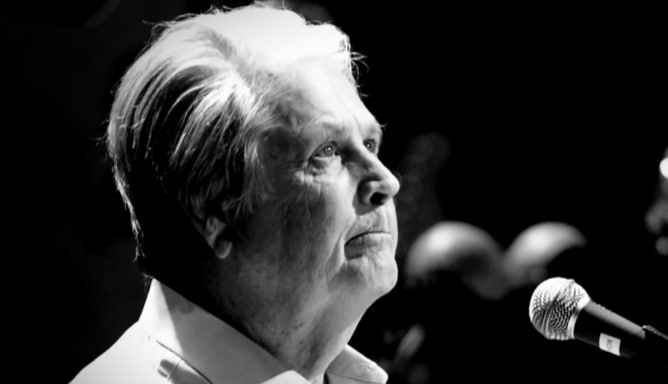Brian Wilson, Co-Founder of The Beach Boys, Dies at 82
Brian Wilson, the legendary musician and co-founder of The Beach Boys, has passed away at the age of 82. His family confirmed the news through an official statement released on his verified Instagram account, asking fans for privacy while they grieve. The message closed with two words that defined much of his career and life philosophy: “Love & Mercy.”
Wilson’s death marks the end of an era in popular music. Widely celebrated as one of the most innovative and influential figures in modern music, his contributions reshaped the sound of rock and pop throughout the 1960s and beyond. His extraordinary ability to blend vocal harmonies with groundbreaking studio production techniques established him as a creative force whose work inspired generations of musicians.

Early Life and Musical Roots
Brian Douglas Wilson was born on June 20, 1942, in Inglewood, California. He was the eldest son of Audree Neva and Murry Wilson, and he grew up in a household where music was part of daily life. His brothers Dennis and Carl Wilson would later join him in forming the Beach Boys, creating one of the most famous sibling partnerships in music history.
As a teenager, Wilson developed a deep love for vocal harmony, influenced by artists like the Four Freshmen. He also admired the songwriting of Chuck Berry and Phil Spector, which would later guide his own approach to composition and production. His natural ear for harmony and arrangement set him apart from many of his peers even before his professional career began.

Founding The Beach Boys
In 1961, Brian Wilson joined forces with his brothers Dennis and Carl, cousin Mike Love, and friend Al Jardine to form The Beach Boys. The group quickly gained recognition with songs that captured the Southern California lifestyle of surf, cars, and youth culture. Hits like Surfin’ U.S.A. and California Girls became cultural touchstones, establishing the Beach Boys as a leading force in American popular music.
Wilson’s role was far more than that of a band member. He was the group’s chief composer, arranger, and producer, pushing the boundaries of what pop music could sound like. His work in the studio transformed the Beach Boys’ music from simple surf rock into complex, layered arrangements that rivaled classical compositions in their sophistication.

The Landmark Album Pet Sounds
Perhaps Wilson’s most enduring achievement was the creation of Pet Sounds, released in 1966. Though not an immediate commercial blockbuster in the United States, the album earned critical acclaim and later came to be regarded as one of the greatest albums of all time. Songs like Wouldn’t It Be Nice, God Only Knows, and Caroline, No displayed Wilson’s genius for combining emotional depth with technical mastery.
Paul McCartney and The Beatles have repeatedly credited Pet Sounds as a major influence on their own landmark work, Sgt. Pepper’s Lonely Hearts Club Band. Today, Pet Sounds consistently ranks at the top of “greatest albums” lists, cementing Wilson’s reputation as a visionary artist.
In 1966, Wilson also composed Good Vibrations, a song that broke new ground in recording techniques. Known as a “pocket symphony,” it used innovative studio layering and modular recording, becoming one of the most celebrated singles in pop history.

Later Career and Challenges
While Wilson’s musical contributions soared, his personal life was often marked by challenges. He struggled with mental health issues for decades, facing depression and other difficulties that limited his ability to perform regularly. Despite these challenges, he continued to record and occasionally tour, supported by family, bandmates, and close collaborators.
In the 2000s, Wilson enjoyed a creative resurgence. He completed and released Smile in 2004, an ambitious project he had first attempted with the Beach Boys in the 1960s but abandoned due to pressure and personal struggles. The completed album was met with critical acclaim and introduced Wilson’s genius to a new generation of listeners.
Health and Conservatorship
In early 2024, Wilson’s life took another turn when his wife, Melinda Ledbetter, passed away. Following her death, Wilson’s family petitioned for a conservatorship, citing a medical diagnosis of a major neurocognitive disorder, similar to dementia. Court filings at the time stated that he was no longer able to provide for his personal needs, and professional conservatorship was established to oversee his care.
This decision reflected the seriousness of Wilson’s health condition, but his family continued to emphasize the love and support surrounding him. Even as his health declined, Wilson remained a beloved figure, admired not only for his music but also for his resilience in the face of adversity.

Passing and Family Statement
Brian Wilson died peacefully in his sleep at his home in Beverly Hills, California, on June 11, 2025. His family’s announcement did not specify a cause of death, and out of respect for privacy, no further medical details were immediately released.
In their statement, Wilson’s children expressed gratitude for the outpouring of love from fans and acknowledged the global impact of his music. The message resonated deeply with admirers worldwide, many of whom shared memories of how Wilson’s music had touched their lives.
A Lasting Legacy
Brian Wilson’s influence on music cannot be overstated. He transformed pop from a singles-driven market into a medium for artistic expression. His innovations in multi-track recording, vocal harmony, and production remain essential references for musicians and producers today.
Beyond technical achievements, Wilson’s music carried a deep emotional resonance. Songs such as God Only Knows continue to be praised for their honesty and vulnerability, qualities that were rare in pop music at the time. His work inspired artists ranging from The Beatles and Elton John to contemporary musicians who still cite him as a guiding influence.
Wilson leaves behind seven children and a vast catalog of music that continues to inspire. His career spanned more than six decades, and his songs remain part of the soundtrack of American life. From surf anthems to orchestral pop masterpieces, his work bridged generations and transcended trends.

Conclusion
Brian Wilson’s passing is a profound loss to the world of music, but his legacy is secure. As fans around the globe revisit his recordings, his influence will continue to be felt in every corner of popular music. From the youthful energy of Surfin’ U.S.A. to the emotional depth of Pet Sounds, Wilson gave the world songs that endure across time.
For many, Brian Wilson was more than a musician; he was a symbol of creativity, resilience, and the power of harmony—both musical and human. His story is one of triumphs and struggles, but above all, it is the story of a man who used music to connect hearts around the world.
